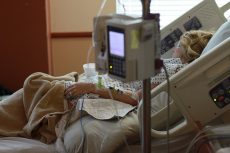Did you know that around 63% of all people who file for bankruptcy have a significant health care bill logged, and it’s most probably a hospital bill? For most of history large medical bills might have been included on credit reports, but lenders ignored it, which meant people could still get loans and still qualify for new credit cards. It pretty much meant that even if you were getting calls from collection agencies regarding medical bills and you ignored them that it wouldn’t impact your credit scores at all.

Parentingupstream via Pixabay
Those days are long gone. Just like anything else that shows up negative on your credit report, if you haven’t attempted to take care of an outstanding medical bill you can’t buy a house or a car, you can’t get a credit card… you’re pretty much stuck with the consequences. Some people think it’s unfair because medical bills can be extensive and it’s not like anyone volunteers for the worse case scenarios. Still, hospitals, physicians, clinics, whatever… these are professional businesses, and they deserve to get paid.
The lucky thing for you is that, unlike other creditors, in general they can’t send your bill to a collection agency until it’s been in self pay for 120 days. That is, unless you’re a serial non-payer, in which case all bets are off. Sure, you can go to the emergency room for treatment, but there are many procedures they don’t have to do if you don’t have the ability to pay them or show a pattern of nonpayment.
With that said, there are some things everyone should know that can help you out, or at least offer you knowledge so that you know what’s going on. Health care providers aren’t heartless; well, most of them aren’t in any case. Here are 4 things you should be aware of and try to take care of before you get into too much trouble:
1. Insurance Payments.
Even if you have insurance, sometimes you’ll still owe some kind of balance and have to make some kind of payment. Those without insurance make bigger payments than insurance companies do because insurance companies have contracts with providers whereas individuals don’t.
At least they used to. You need to know that in many states you have the right to ask the hospital to bill you for the amount that they would receive from their worst contracted insurance payer. It could still be a lot of money, but it gives you a better place to start when it comes to negotiating a payment arrangement.
If you buy insurance through a government health exchange, even with a high deductible your out of pocket costs will be lower than not having insurance at all. There’s a few things you have to gauge.
One, if you’re 27 or younger the cost of insurance will cost you less than when you’re older unless you have kids. You might not get sick all that often and probably won’t have some of the critical issues older people have, but if your lifestyle puts you in a place where you could injure yourself badly via an accident, it’s smarter to buy the insurance if your employer doesn’t offer it.

12019 via Pixabay
Two, as the Affordable Care Act stands right now, if you decide against insurance you still have to pay the penalty for not having it. The rate is less than what you’re pay for yearly insurance, so that’s a consideration to make. It’s possible things could change, but it’s always better to have insurance “just in case”.
Three, if you’re older than 27, even without kids, the cost of insurance will be higher than if you were younger. It will still cost you less not to have insurance but the older you get the more things can happen to you, even if you don’t live a dangerous life.
Just remember that even the best of plans may not cover everything in full. Keep this in mind even if your insurer offers insurance coverage; your out of pocket costs at work might cost you less for services, but if you lose your job COBRA will be an outstanding cost that almost no one can afford.
2. Payment arrangements.
Every hospital will offer some kind of payment arrangement. The industry recommendations have always been to try to get an entire bill paid within 6 months, but for those extremely large bills they know better; at least in most places they do. It’s best to set something up, or at least talk to the people at the hospital to see what can be done.
Depending on amount, it’s best to try to offer payment of at least $100 a month if you can afford it. If you can’t, offer a fair amount. Years ago hospitals would accept payments of $10 a month; that’s never going to happen again. The people you talk to are willing to work with you based on your income. Don’t hurt yourself but take the process seriously.
3. Charity Care.
The reason you do what’s mentioned in #2 is because of this part. Public hospitals have to offer charity care, which is a combination of how much money your household makes as well as how high your hospital bill is. Charity care will either get you a discount on the amount of your outstanding bill or erase the debt entirely. Each state has its own rules, and hospitals can add to that as long as they make sure they hit the minimums.
In some states, hospitals are required to help you file for Medicaid first (although if you don’t do your part it’s all on you), but that’s only if your income puts you at your state’s poverty level. In most instances your income is probably higher than the Medicaid levels and, after they’ve made that determination, they’ll get to the actually charity care paperwork.
It may take them up to 30 days to complete the evaluation, but during that period of time you’re not expected to make any payments. Just know that if you don’t get your entire bill adjusted off, you’re going to have to agree on a payment arrangement to pay off the balance or the charity care portion could be eliminated and you’ll once again be responsible for everything.
4. Make some kind of payment.
This is an insider secret that most hospitals don’t want you to know. At least 90% of all hospital billing systems will restart the billing cycle from the beginning if you send in some kind of payment. What this means is that if you send in a payment of at least $20, you could end up buying yourself a lot of time before someone actually takes a look at your account and decides to give you a call to work out a better payment arrangement. That’s because there are thousands of medical bills being worked on at all times, and billing personnel often only pay attention to unpaid or very high dollar bills.
This works best if your bill is under $1,000 or so, sometimes under $5,000 at large hospitals because many computer systems can’t be set to expect payments of specific amounts, only to log payments that have come in. This is one of those times where staying hidden and avoiding a problem totally works against you, so give it a shot. Just so you know, it doesn’t work as well for physician’s groups, but we’ve found that if you’re making a significant payment on a higher amount bill they’ll usually leave you alone as long as you’re consistently making a payment.